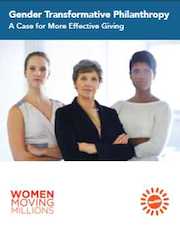Site Search
- resource provided by the Forum Network Knowledgebase.
Search Tip: Search with " " to find exact matches.
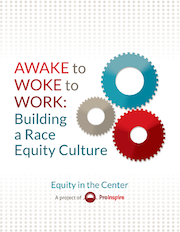
Bank of America is making a $560,000 donation to the Career Services Center at New Jersey City University to aid in the effort to help students of color successfully complete the education and training necessary to enter the workforce and embark on a path to success.
The unique grant is the largest single corporate gift and most significant investment in career development in NJCU’s history, school officials said. The investment is in the form of a four-year grant that will address racial, ethnic and income inequality.
Access to good jobs and meaningful careers is key to closing the racial and ethnic wealth gap. Students of color often face daunting challenges, including financial hardship, lack of guidance in choosing courses that will help them achieve success, and lack of internship and skill-building opportunities to prepare for career readiness.
Bank of America officials said the company is working to address these issues as part of its $1.25 billion, five-year commitment to help advance racial equality and create economic opportunity by focusing on priority areas of jobs/education/skills, health, small business and housing.
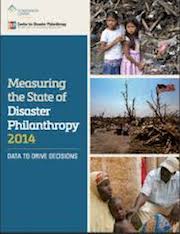
CNJG encourages its membership to participate in the Council on Foundations’ annual salary survey to help shape the future of philanthropic compensation.
The Council on Foundations’ 2025 Grantmaker Salary and Benefits (GSB) Survey is now open. The deadline to complete the GSB is Wednesday, May 28, 2025.
Since 1980, the GSB has provided the philanthropic sector with the most comprehensive data on staff composition and compensation in the United States. Grantmakers rely on the findings from this annual survey to plan budgets, benchmark personnel policies and practices, determine salary levels for new and existing staff, and more. Those who complete the survey will receive a free copy of the report (a $598 value), early access to the report’s data tables, and access to create custom benchmark reports.
CoF’s full survey will be published in fall 2025. More information and the survey may be found on the Council on Foundations' website.
Any and every philanthropic organization is invited to participate. Membership is not required with either the Council on Foundations or Council of New Jersey Grantmakers to participate in the survey. For more information, including a list of FAQs, visit the Council on Foundations' website or email the Council on Foundations communications team.
CNJG incorporates the data from this annual survey into our triennial Philanthropy Benefits & Salary Summary Report, most recently published in 2023. CNJG plans to update our report in 2026 again using the data from the Council on Foundations’ survey.
CNJG encourages our members and all philanthropic organizations in New Jersey to complete the CoF survey each year, as this benchmarking data is frequently asked for by our members. The more foundations and other philanthropic organizations that complete the survey, the better and more statistically relevant data we will all have.
For additional information or questions, please contact Craig Weinrich at CNJG.
Under-resourced communities are going without because nonprofits can't meet demand. Americans —particularly those in low-income communities—are still struggling to secure jobs, affordable housing, and healthcare. Nonprofit Finance Fund’s 2015 State of the Nonprofit Sector Survey focuses on the underlying causes of these dynamics by exploring the programmatic, financial, and operational issues facing nonprofits across the U.S.
NFF launched the Survey in 2008, when economic crisis threatened the viability of many organizations. Seven years later, results from 5,451 respondents show some indications of recovery, stabilization, and growth. Nonprofits are adding jobs, engaging in strategic conversations such as leadership succession planning, and looking to retain their workforce. Yet as they raise their sights from the focus on short-term crisis, many are confronting the troubling reality that current practices cannot sustain organizations in the long-term or meet the needs of the communities they serve now. Many organizations have stumbled out of crisis looking to make the necessary investments to secure their long-term future. And it is a hard road ahead.
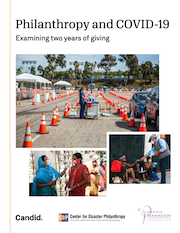
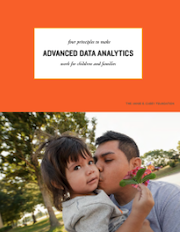
Advanced analytical tools are embedded in business and government operations and, increasingly, in state and federal policy. Whether these tools benefit or harm communities depends on their design, use and oversight. Fortunately, advocates for children and families have an opportunity to shape the rapidly evolving field of advanced analytics and create frameworks that make these tools work for — not against — young people.
This brief looks at the rapid rise of advanced analytics and explores the controversies, ethical challenges and opportunities that it creates for youth- and family-serving agencies. As the document’s title suggests, it also presents four principles for identifying effective and equitable advanced analytics tools. To help illustrate these principles, the text presents real-world examples of jurisdictions using data science in ways that live up to — or fall short of — the social sector’s quest to develop better and fairer solutions for kids, families and communities.
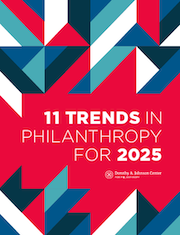
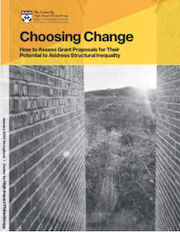
The COVID-19 global pandemic exacerbated longstanding disparities by race, gender, and socioeconomic status. Individuals, communities, and countries that were already vulnerable were even more at risk. The Choosing Change toolkit can help individual donors and institutional grantmakers at all levels identify proposals and teams whose work addresses the structural inequalities that prevent people from surviving, let alone thriving.
